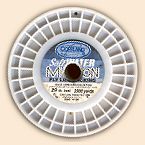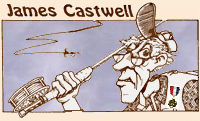|
"What is the best line to use for backing?"
You might as well ask, "What's the secret of the universe?"
There are far too many variables for there to be one best
answer. Different conditions suggest different backing.
For the most part it comes in two basic sizes, well, at
least it used to. For years the choice was twenty pound
or thirty pound, you sometimes had a choice of color.
Then the 'new' gel-spun stuff hit the market and the
whole game seemed to change. No longer was the old
standard twenty or thirty the right choice, it got
complicated. Then add Teflon coating for use in saltwater
to make it slip thru the guides and the water easier.
Now 'micro' sizes are available as well. You choice can
now become very difficult. Here are a few elements to
enter into your equation for the right backing for you.
If you are just filling up a small trout-sized reel so the
fly line will be at the top of the spool and not all buried
down by the center spindle use anything except monofilament.
Monofilament can distort the sides of your reel and bust it. Probably
the twenty pound would be my choice. If you are going after
some specie of fish that will pull hard but not swim real
fast then thirty can be a good idea. If the fish has a
tendency to come back at you fast and you might accidently
wind a few loose turns of backing onto the spool then
you will want the thirty. Because it is larger in
diameter it won't jam itself into the coils and stop
your reel dead when the fish decides to go back out.
It is rare to find one of us who has not had something
like that happen at least once.
There is more. Suppose the fish swims like a shot, a bonefish
for instance. Fast and strong. Here you need backing that
will not drag a lot in the water. The normal sized thirty
will look like a clothes line dragging a big circle behind
the fish and increasing the drag with every wag of Mr. Bonz'
tail. Been there, got that hat. The smaller diameter twenty,
or perhaps the micro stuff may be called for. I use the Micron
Teflon coated twenty for those times. It is small enough and
slick in the water and the guides and does not make a big
circle behind a running fish.
The one kind I really do not like is the gel stuff, or
spider-wire or whatever you like to call it. When I have
a fish big enough to strip backing I do not want to take
the chance of getting my fingers cut to the bone by my
backing. It is one thing to have some fly line in control
under my fingers but that skinny backing is deadly. It
will cut into me or into itself on the spool if given
any chance at all.
Now there will be some who will tell you they have used
it for years without any problem. Good, glad they haven't
had any problem . . . yet. There is no one who has not
grabbed or pinched, or thought of grabbing or pinching
the backing to stop a fish. Are there more opinions on
backing? You bet, just ask at your favorite fly-shop or
watering hole. You're probably reading this looking for
answers and all you have now are more questions, sorry
about that. If I had all the answers I would write a
book or something. I have been at this a few years and
I still have questions, guess that's why I keep trying.

Will you, when armed with all the answers, always have
the right backing on your reel when you go out? Probably
not. How much does it matter? That's up to you. How much
does it?
P.S. I use the Cortland Micron Teflon twenty for everything.
~ James Castwell
|



